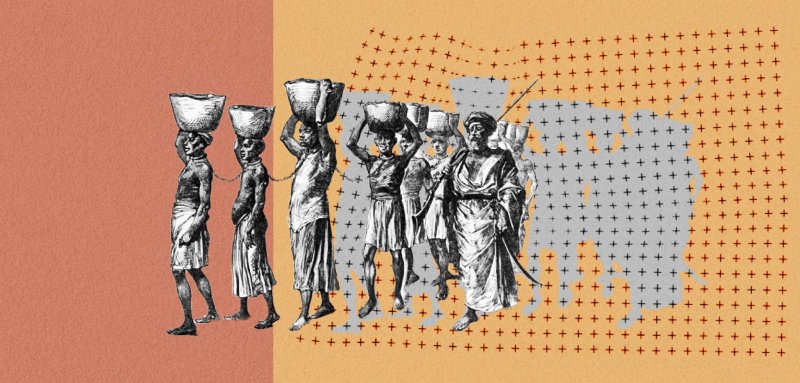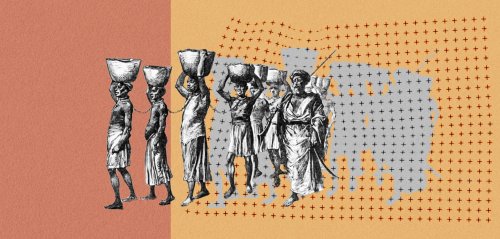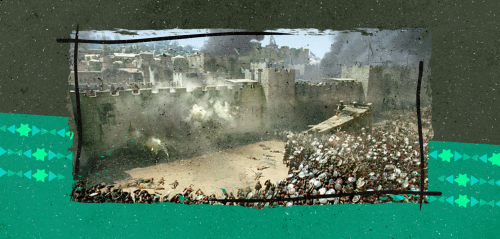The presence of the Zanj in Iraq dates back to the first century AH (Hijri Islamic calendar). The first attempts to revolt against their conditions were in the province of Mus'ab ibn al-Zubayr in Kufa. Then, an organized rebellion movement emerged in 75 AH / 649 AD, led by Rabah, who was nicknamed "Shir Zanji", meaning the “Lion of the Zanj”), and it seems that they faced an early failure.
Later on, the prosperity of Iraqi society during the Abbasid era, starting from the caliphate of Harun al-Rashid, led to the expansion of large-scale production projects that required manpower and a significant workforce, which the wealthy found in the enslaved class. Within a social system that allowed the acquisition of an unlimited number of slaves and the utilization of their efforts, they were brought in organized campaigns from Africa and sold in well-known markets, and these were the same abduction and enslavement practices that Europe and the Americas had carried out for centuries and did not cease until the late 19th century.
Most of the slaves in southern Iraq worked in land reclamation (clearing and cultivation) in the region where the Tigris and Euphrates rivers meet, as well as on large farms. They worked in groups supervised by wardens appointed by the landowners, and they were treated with contempt and lack of respect by the wardens and owners. In such a situation, it is natural for feelings of resentment, a desire for emancipation, and a readiness for revolution and revenge to arise.
The leader of the Zanj rebellion wasn't a Zanj
The Zanj revolution was led by Ali ibn Muhammad, who claimed to be of Hashemite descent. Historical references differ regarding the validity of this lineage. Some suggest with evidence that he was of Persian origin, while others claim his Arab lineage to the Hashemites, such as the historian al-Mas'udi, who questioned this lineage due to the large number of descendants of Ali ibn Abi Talib, which at that time was said to be numbered in the thousands and wasn't mentioned in historical books. It is difficult to prove one account over the other, but what is certain is that he was not Zanj, but rather an Arab or Persian who distinguished himself by a sense of opposition to the Abbasids, even though he began his life as a court poet, or had at least established relationships with several statesmen. He had political ambitions that manifested in repeated attempts in Baghdad, Bahrain, and Mosul to assume a leadership role and establish a new authority, all of which failed. However, he possessed the competence and eligibility that enabled him to lead a revolution for the oppressed, even though he himself was from outside that group, and this is not uncommon in the history of revolutions.
Ali ibn Muhammad claimed 'knowledge of the unseen' and having the support of the angels, and it seems his affiliation with the Hashemites have helped him attract more supporters at a time when Shia uprisings were taking place
Mystery surrounds the manner in which Ali ibn Muhammad began, his propaganda, incitement to the revolution, and the gathering of some slaves around him. The available details start from the moment he set off in 255 AH/869 AD, along with a group of followers carrying banners inscribed with the Quranic verse 111 of Surah At-Tawbah, which was previously used by the Kharijites: "{Indeed, Allāh has purchased from the believers their lives and their properties [in exchange] for that they will have Paradise. They fight in the cause of Allāh, so they kill and are killed}.." Whenever he passed through a place where there were slaves, they would join him, and he would arrest their wardens. He continued in this manner for a whole day until he gathered a large number of people, whom he addressed at night in a speech, announcing his "political program," if that term is applicable, which can be summarized as liberating the slaves and transforming them into masters and land owners. He then ordered the wardens to be tied up and instructed the slaves to strike them with palm branches as revenge before releasing them.
According to Al-Tabari, Ali ibn Muhammad claimed 'knowledge of the unseen' and having the support of the angels, and it seems his affiliation with the Hashemites have helped him attract more supporters at a time when Shia uprisings were taking place. This reinforced the idea that liberation from the authority of the Abbasids would only come through the Shiites or Alawites. Some Arabs joined his movement, but the central idea he focused on was justice and ending oppression. This attracted not only the oppressed Zanj people but also some farmers and individuals who resented the Abbasid caliphate's authority in the southern tribes of Iraq, enabling him to form a large army that spread across a wide area.
Like any military leader, Ali ibn Muhammad employed effective tactics in each battle and situation. Accounts differ regarding his mercy, as some stories depict him restraining his soldiers from unnecessary killing and looting, while others describe an adopted policy of destruction, revenge, and the enslavement of captives, including women and children.
The Zanj state
The rebel authority expanded towards major cities in southern and eastern Iraq, with plans to attack Baghdad and seize control of the Abbasid caliphate. They used reconnaissance and espionage to monitor the movement of the Abbasid forces and engaged in numerous battles, often defeating them. Ali ibn Muhammad's intelligent leadership played a significant role. They employed ambushes and traps in swamps and roads, utilizing guerrilla warfare tactics. Their great victory came with the capture of the city of Basra, where they committed various atrocities such as killing, destruction, rape, captivity, and looting.
Al-Tabari narrated, "The missing in Basra became many, and the wailing of their women rose, and the killings reached a sizaebale magnitude. Among those killed were a group from the descendants of Jaafar ibn Sulayman, belonging to the Banu Hashim." This event is referred to as "After the destruction of Basra", signifying the revolution being crushed by the Abbasid army. After Basra was destroyed, burned, its people killed, and the remaining enslaved, this event was immortalized in the famous elegy of the poet Ibn al-Rumi, despite his dislike for the Abbasids.
The rebellious Zanj took advantage of the weakness of the central authority in Baghdad, and their activities reached the outskirts of the city, threatening and causing concern for the caliphate's power. How did the caliphate respond to this threat?
The rebellious Zanj took advantage of the weakness of the central authority in Baghdad, and their activities reached the outskirts of the city, threatening and causing concern for the caliphate's power. Their movement continued for about fifteen years during which they controlled a large geographic area extending between Ahwaz and Wasit, in addition to Basra, Abadan, and Khuzestan. Some of the Zanj leaders – who were mostly Arabs – were distinguished with military tactics that took advantage of the terrain and enabled them to confront and thwart the campaigns of the Abbasid army for years.
Inevitable end
The caliphate's control became increasingly strained by the Zanj rebellion until 266 AH, when the Abbasid commander Talha, brother of Caliph Al-Mu'tamid, focused on planning crushing the rebellion after dealing with the Saffarids in Persia. He dispatched an army of fifty thousand fighters led by his son, Abbas, supported by warships built by the Abbasids for trade and military purposes, patrolling the river from Baghdad to the Shatt al-Arab. The first battle took place in the city of Wasit, which Prince Abbas managed to liberate. He then established a city called "Al-Muwaffaqiyah" after himself, facing the Zanj's capital city named "Al-Mukhtarah," serving as a launching point for repeated attacks on the Zanj forces.
Then, he adopted a policy of siege and starvation and thus began to defeat them in one battle after another. The rebels benefited from the natural terrain of Ahwaz in their defensive strategies, allowing them to hold out for three years while the Abbasid army gradually encroached on their territory, up until the decisive battle in "Al-Mukhtara." The rebels fiercely defended it due to the spiritual and mystical beliefs instilled in them by their leader, Ali ibn Muhammad, according to Al-Tabari's interpretation. The battle lasted for nearly a year in the final stronghold before the Abbasid army managed to end it and kill Ali ibn Muhammad in the year 270 AH/883 AD.
Thus, the curtain fell on a revolution that had established its own state on the borders of the caliphate for fourteen and a half years. However, it did not completely fail, as it prevented the return of the system of collective enslavement of the blacks on farms and fields – a system that had been prevalent before – and the Abbasids continued to manage those remaining for fear of a resurgence of rebellion.
In the balance
In retrospect, like many historical events and their interpretations, there were different perspectives and analyses of the Zanj revolution. Leftist supporters saw it as a revolution of oppressed laborers, with full legitimacy to do so. Those who defended the caliphate considered it a destructive rebellion against the Islamic state, while some Arab nationalists classified it as an anti-Arab popular movement.
There are no detailed reports about how the revolution's leaders managed their internal affairs, such as resource management and distribution. It seems that the revolution did not prioritize the just distribution of wealth and spoils or publicizing it as the Qarmatians did. The proclaimed plan of the Zanj leader in his speeches was not aimed at changing the entire social system but rather alleviating the suffering of the enslaved black class.
The revolution, which aimed to liberate the slaves, did not completely sever its ties with the class-based system. Instead, it reversed the roles, and former slaves became owners of new slaves captured in confrontations or raids.
The revolution began with a noble liberation goal that initially aligned with its methods. However, its subsequent vengeful and chaotic tendencies led to its downfall. Al-Dhahabi mentioned in his book "Al-'Ibar" that they attacked the city of Wasit, causing its residents to flee barefoot and stripped of their possessions, while their homes were looted and burned. Al-Tabari also documented that they stole the covering of the Kaaba in the year 266 AH.
Writer Faisal al-Samer mentions in his book "The Zanj Revolution" that many references provided evidence of the principles that the Zanj leader adhered to. He abstained from violence and looting when his revolutionaries were prepared to commit such acts, restraining their impulse for killing and revenge. However, the course of the revolution as a whole contains a lot of violence that exceeds the necessities of victory, a characteristic that has marked many revolutions throughout human history. The question here about the moral and ethical principles in war becomes a misplaced question if we do not take into account the historical context in a region where military behavior of this nature was prevalent, whether in the mutual raids and invasions between tribes or in army wars between states and empires.
The most striking paradox here is that the revolution, which aimed to liberate the slaves, did not completely sever its ties with the class-based system. Instead, it reversed the roles, and former slaves became owners of new slaves captured in confrontations or raids on villages and caravans, including the abduction of children and using captives as servants. Perhaps this vengeful mindset dominated the rebels' struggle with the owners and the authority of the caliphate, thus causing the revolt's main objectives to become obscured, within a fierce struggle where the revolution itself perpetuated the same social disorder the people rose up against, in reverse.
Raseef22 is a not for profit entity. Our focus is on quality journalism. Every contribution to the NasRaseef membership goes directly towards journalism production. We stand independent, not accepting corporate sponsorships, sponsored content or political funding.
Support our mission to keep Raseef22 available to all readers by clicking here!
Interested in writing with us? Check our pitch process here!







